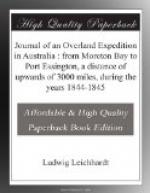Sandstone cropped out in the banks of the creek, and formed the reservoirs in its bed.
Last night, and the night before, we experienced a very cold wind from the southward.
The laughing Jackass (Dacelo cervina, Gould) of this part of the country, is of a different species from that of the eastern coast, is of a smaller size, and speaks a different language; but the noise is by no means so ridiculous as that of Dac. gigantea: he is heard before sunrise, and immediately after sunset, like his representative of the eastern coast. The latter was observed as far as the upper Lynd, where the new one made his appearance.
We crossed a bush fire, which had been lighted just before we came to the creek, but we did not see the incendiaries. In the morning of the 10th July, however, they had discovered our tracks, and followed them until they came in sight of the camp; but retired as soon as they saw us: and when they met Charley returning with the bullocks, they ran away. After half-an-hour’s travelling towards the south-west, we came to the Van Diemen, which is marked in Arrowsmith’s map in latitude 17 degrees. It was about seventy or eighty yards broad, with steep banks and a fine sandy bed, containing detached pools of water surrounded by Polygonum, and extremely boggy. My horse stuck in the mud, and it was with great difficulty that I extricated him.
As our meal bags were empty, and no sign of game appeared, I decided upon selecting a good open camping place, for the purpose of killing our last little steer. The country was a fine open grassy forest land, in which the apple-gum prevailed, and with many swampy grassy lagoons covered with white, blue, and pink Nymphaeas. The box tree grew in their immediate neighbourhood.
In the bed of the Van Diemen we saw some well constructed huts of the natives; they were made of branches arched over in the form of a bird-cage, and thatched with grass and the bark of the drooping tea-tree. The place where we encamped had been frequently used by the natives for the same purpose. Our attention was particularly attracted by a large heap of chaff, from which the natives appeared to have taken the seeds. This grass was, however, very different from the panicum, of the seeds of which the natives of the Gwyder River make a sort of bread; and which there forms the principal food of the little Betshiregah (Melopsittacus undulatus, Gould).
The night was calm, clear, and cold.
The kites became most daring and impudent. Yesterday, I cleaned the fat gizzard of a bustard to grill it on the embers, and the idea of the fat dainty bit made my mouth water. But alas! whilst holding it in my hand, a kite pounced down and carried it off, pursued by a dozen of his comrades, eager to seize the booty.




